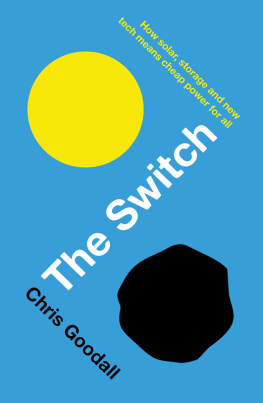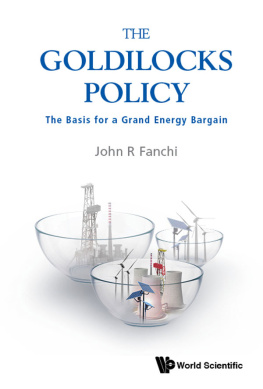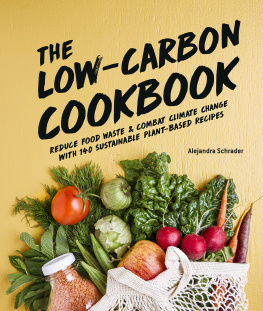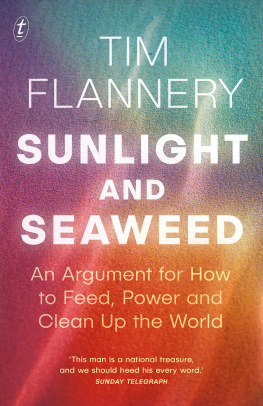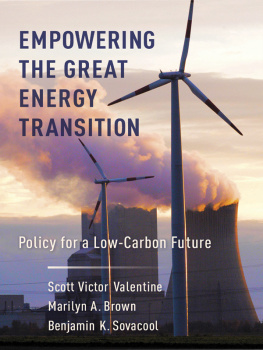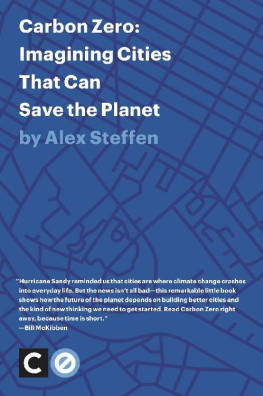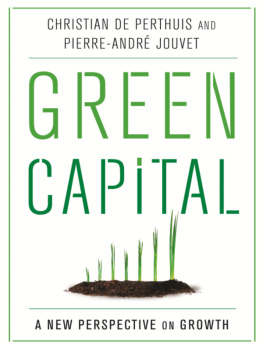WHAT WE NEED TO DO NOW
FOR A ZERO CARBON SOCIETY
First published in Great Britain in 2020 by
Profile Books Ltd
29 Cloth Fair, Barbican,
London EC1A 7JQ
www.profilebooks.com
Copyright Chris Goodall 2020
The moral right of the author has been asserted.
All rights reserved. Without limiting the rights under copyright reserved above, no part of this publication may be reproduced, stored or introduced into a retrieval system, or transmitted, in any form or by any means (electronic, mechanical, photocopying, recording or otherwise), without the prior written permission of both the copyright owner and the publisher of this book.
A CIP catalogue record for this book is available from the British Library.
ISBN 9781788164719
e-ISBN 9781782836667
WHAT WE NEED TO DO NOW
FOR A ZERO CARBON SOCIETY
Chris Goodall

The world is waking up. And change is coming, whether you like it or not
Greta Thunberg at the United Nations 23 September 2019
Contents
We need to create a zero carbon world by 2050 or earlier
Powering (almost) everything with wind, sun ... and hydrogen
Taking back local control of our energy generation and distribution
We need effective insulation of homes and to convert gas boilers to run on hydrogen
A fast track to electrification, car-sharing and free public transport
We need to fly less the hardest challenge for zero carbon. And shipping should run on hydrogen
Without big changes, clothing alone will stop us achieving net zero
Using less cement and other resources and replacing fossil fuels in heavy industry
The global climate costs of meat are not sustainable
Using forests and woodland to suck CO2 from the air
The economists answer to the climate crisis
A vital technology for reducing carbon dioxide levels
Preparing to combat the worst consequences of climate change
Its not just governments our own actions can make a real difference
NOTES & SOURCES
For sources of data throughout this book, most of them online, see the What we need to do now section on my Carbon Commentary website (www.carboncommentary.com). The website includes further analysis and updates on topics featured in the book, and you can also subscribe to a free regular newsletter.
INTRODUCTION
A NEW DEAL FOR CLIMATE
We need to create a zero carbon world by 2050 or earlier
It feels like a turning point. In the past year, tens of national governments have stated that they will cease emitting greenhouse gases by 2050. The UK did so in May 2019, declaring a climate emergency. Scotland made a commitment to cut emissions to zero by 2045, planning to get three quarters of the way there by 2030. Among our European neighbours, France and Spain have also legislated for zero greenhouse gases by 2050. Norway, the most ambitious, is aiming for 2030, although it will still extract oil for sale overseas, making its commitment very much less impressive.
Many cities, regions and states have set even more challenging targets. Similarly, a rapidly rising number of major companies have pledged to getting to net zero, often by 2030 or even earlier. (Net zero means that any remaining greenhouse gases are at least counterbalanced by extraction of CO2 from the atmosphere by trees and/or technology.)
Even twelve months ago, these statements of intent seemed very unlikely to be made. But intense public concern about the environment combined with a growing sense that advanced economies really do have the capacity to make the transition away from fossil fuels has increased the willingness of companies, cities and countries to make promises on climate change.
In almost all cases, that is exactly what these statements are promises. They have rarely been accompanied by even the most general plans for how the move away from greenhouse gases will be achieved. The UK government can make a case for being better than most, as in May 2019 its principal advisers, the Committee on Climate Change, issued a report on how it saw the path to zero emissions. But it is an inadequate blueprint, all too heavy on statements of desirability rather than actual plans.
WHY THE UK NEEDS TO ACHIEVE ZERO EMISSIONS
Each tonne of carbon dioxide emitted to the atmosphere adds to the climate problem. The CO2 will typically remain in the air for hundreds of years, unless it is removed from the atmosphere. Fossil fuel use today will therefore still be causing problems in the lifetimes of our great grandchildren. It is the stock of greenhouse gases in the atmosphere that determines how hot it will get, not how much is emitted in any single year.
Climate researchers often talk of a global carbon budget, which is the total amount of CO2 and other greenhouse gases the world can emit and still remain below global heating of 1.5 or 2 degrees Celsius. (So far, the we have seen an average temperature increase of about 1 degree over pre-industrial levels). Theres considerable debate over these figures but in January 2018 the Intergovernmental Panel on Climate Change (IPCC) said the world should emit not more than 420 gigatonnes of carbon dioxide to have a 67 per cent chance of avoiding a rise of 1.5 degrees. Today that figure is down to less than 350 gigatonnes and global emissions are running at around 40 gigatonnes each year. This means we probably need to achieve zero global emissions by 203035 to keep total heating below 1.5 degrees, and 204050 for a 2 degree target.
Scientists also tell us that, if we do increase temperatures by more than 2 degrees, we face a much increased risk of unleashing further heating. Feedbacks such as melting ice reducing the reflectivity of the worlds surface, thus retaining more heat, become more likely as global heating progresses.
Reducing emissions to zero within thirty years should be the worlds most important objective. Even a 2 degree temperature rise will have very substantial effects around the world, including intense rainfall and flooding, rising sea levels and periods of searing drought.
HOW THE UK PLAYS ITS PART
The purpose of this book is to give an outline of the strategy the UK needs to adopt to address the climate threat what we need to do now. It is a plan that will be similar to that of most other European countries, though each has different challenges and advantages. The UK, for example, has old and poor housing stock, but viable solar power and massive potential for onshore and offshore wind. We also have less than the European average forest cover, and can do much good by a radical reorganisation of our farmland.
We should pursue this strategy, or better alternatives, both because our country should play its part in addressing the global climate threat and because an effective zero carbon strategy will provide multiple benefits to our fellow citizens, both economic and social. Some would argue that the UK has a particular responsibility for leading the way in reducing emissions. We began the Industrial Revolution and our historic wealth is based on fossil fuels. But this is no time for historical debate. We need to act now, in concert with Europe and the world. We can and should become leaders in zero emissions systems and technology.
The UK has made decent progress in recent decades, cutting domestic emissions by 43 per cent since 1990, although a rising volume of imports with high carbon footprints are not included in this figure, nor international aviation and shipping. If all these factors are included, the figures may be closer to 10 per cent (as Greta Thunberg told the UKs MPs in 2019). And it has to be said that most of these reductions have been achieved in relatively easy areas, for example, from the decommissioning of coal-fired power stations. In recent years, progress has slowed, just when it needs to be ramped up to lightning speed. Most independent sources see the UK missing its existing official targets from 2023 onwards.
Next page

